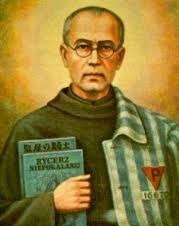Reflection for MONDAY, 19th Week, Ordinary Time.
By

Fr. Aloysius Santiago sdb
Assistant Parish Priest, Manjeshwar, Kasargod
Memorial of St. Maxmillian Kolbe
Today's Gospel songs Passage
Matthew 17:22-27
They will put the Son of Man to death'
One day when they were together in Galilee, Jesus said to his disciples, ‘The Son of Man is going to be handed over into the power of men; they will put him to death, and on the third day he will be raised to life again.’ And a great sadness came over them.
When they reached Capernaum, the collectors of the half-shekel came to Peter and said, ‘Does your master not pay the half-shekel?’ ‘Oh yes’ he replied, and went into the house. But before he could speak, Jesus said, ‘Simon, what is your opinion? From whom do the kings of the earth take toll or tribute? From their sons or from foreigners?’ And when he replied, ‘From foreigners’, Jesus said, ‘Well then, the sons are exempt. However, so as not to offend these people, go to the lake and cast a hook; take the first fish that bites, open its mouth and there you will find a shekel; take it and give it to them for me and for you.
Reflection on the Readings

There are some things in life that are worth fighting for.
Yet, there are also some things in life that we can walk away from.
So, in order to fight the good fight, we must discern if any good is gained from it.
There is no need to fight every fight and lose our energy and strength over the unnecessary.
In the gospel, the tax-collectors asked Peter if Jesus was going to pay the half-shekel tax.
Jesus could have argued and pointed out that He need not pay the tax.
But He said to Peter that He doesn’t want to offend them, and He told Peter how to get that half-shekel in a rather strange way.
We may wonder why Jesus doesn’t want to offend the tax-collectors.
But Jesus knew that those tax-collectors were just following instructions and it would be a waste of time to argue with them.
Let us ask Jesus to help us discern what are the important and necessary things to do that will give glory to God.
Let us fight the good fight for the glory of God and for our good and for the good of others.
14 AUG SAINT OF THE DAY
 S MAXIMILAN KOLBE (1894-1941)
S MAXIMILAN KOLBE (1894-1941)
Maximilian was born in Poland and in his childhood, Our Mother appeared to him in a dream holding
a white crown and a red crown. He later related, “She asked if I was willing to accept either of these crowns. The white one meant that I should persevere in purity, and the red that I should become a martyr. I said that I would accept them both.” At the age of 16, he entered the Franciscan Order. He was sent to study in Rome where he was ordained a priest in 1918. Fr. Maximilian returned to Poland in 1919 and began spreading the Immaculate movement of Marian consecration. In 1927, he established an evangelization centre near Warsaw and the Friars utilized the most modern printing and a monthly magazine with a circulation of over one million. Maximilian started a radio station and he was a true
“Apostle of the Mass Media.” Maximilian was a ground-breaking theologian. His insights into the Immaculate Conception anticipated the Marian theology of the Second Vatican Council and further developed the Church’s understanding of Mary as “Mediatrix” of all the graces of the Trinity, and as “Advocate” for God’s people. In 1941, the Nazis imprisoned Fr. Maximilian in the Auschwitz death camp. There he offered his life for another prisoner and was condemned to slow death in a starvation bunker. On August 14, 1941, his impatient captors ended his life with a fatal injection. Pope John Paul II canonized Maximilian as a “Martyr of Charity” and “Patron Saint of our difficult century” in 1982. St. Maximilian Kolbe is the patron of journalists, families, prisoners and the pro-life movement.
But what happened to Franciszek Gajowniczek - the man Father Kolbe saved? He died on March 13, 1995, at Brzeg in Poland, 95 years old - and 53 years after Kolbe had saved him. But he was never to forget the ragged monk. After his release from Auschwitz, Gajowniczek made his way back to his hometown, with the dream of seeing his family again. He found his wife but his two sons had been killed during the war. Every year on August 14 he went back to Auschwitz. He spent the next five decades paying homage to Father Kolbe, honouring the man who died on his behalf.
GOD BLESS YOU
Good morning. Have a nice day.
